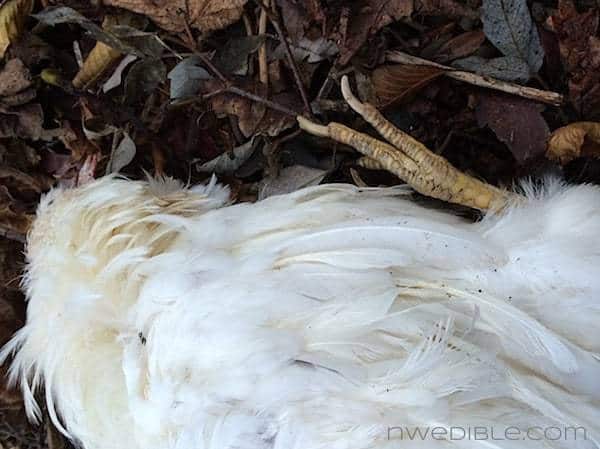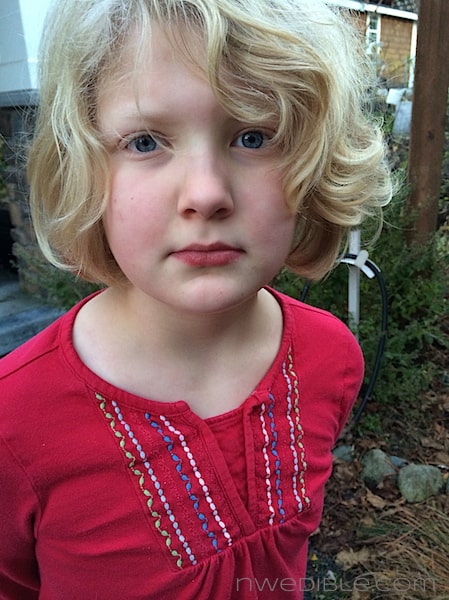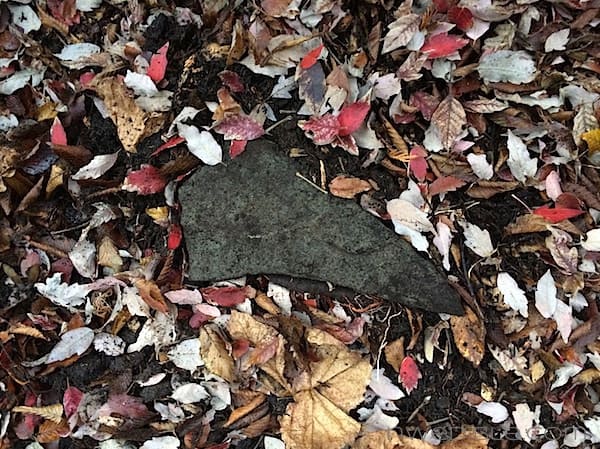Today I put about thirty pounds of pork belly into cure for bacon and pancetta, made a loaf of bread, mixed a bottle of homemade citrus cleaner, and buried one dead chicken.
Get a shovel. This is urban homesteading. If you keep chickens, dead chickens are part of the deal. You get what you get and you don’t throw a fit, as I tell my kids.
Why did this chicken die? Not because I culled her. She wasn’t sick, injured, or otherwise suffering. She died because she was three years old and half White Leghorn and at the bottom of the pecking order. She died because it happens. She just died. By all appearances she died in her sleep, fell off her roost and that was that. Pretty nice way to go, all things considered.

My nine-year-old daughter, whose homestead chore is to check the chickens for food and water and bring in eggs, found the dead chicken.
I was inside, working in the kitchen when my daughter popped her head inside. “Mom: problem. Dead chicken,” she announced.
There were no tears, no freaking out, no panic. She was somber, of course, but what is there in a natural death to panic about? She knew something had happened that required my attention, so she got me. Isn’t this what I wanted when we got hens, anyway, for my kids to be more connected to their food chain, to understand that death is part of life?

My daughter told me this hen’s name was Beth. We don’t name our chickens, typically, but during a playdate a few years earlier, my daughter and her best friend had dubbed one of our two Austrawhites Angel Wings and the other Beth.
And so, together, while my son watched a cartoon inside, we got a shovel and buried Beth under a tree. She was buried the way I’d want to be: in direct contact to the soil. No box, no plastic bag, nothing to separate her from the microbes already hard at work to return her body to the soil. We marked the burial spot with a stone.

Inside, I threw away the disposable gloves I was wearing, washed my hands, and got back to work in the kitchen. My daughter started her homework. Because this is urban homesteading, and you just get it done.
2
It’s sounds like my Grandma Johnson. She suddenly found herself widowed with 5 children and no marketable skills in the middle of the Depression. They survived because they were from farm country and knew how to fish, forage, etc. When something undesirable happened, she’d deal with it, wash her hands and say ” We’ll, that’s that then”
And moved on
She was full of grandmother sayings but one of them has become my battle cry:
“Don’t be so open minded that your brains fall out”
What do you do if the soil is frozen? I’ve mostly just been crossing my fingers and hoping they won’t die in the winter….
We use a pick ax…at least where we are, frost line is officially 13″ but with our deep mulching over most of our property, it’s a lot shallower and the mulch is easy to pick through. I’d keep crossing your fingers though because it’s still not fun work. In the winter I’d also recommend burying a large flat rock over the body so it doesn’t get dug up by an animal and spread everywhere.
I use to work in Wisconsin in the summer. There was one house in the county that was older than the one I lived in. The basement had a dirt floor. When my children came to visit, they had never been around a dirt floor and asked about it. I told them that in years past, before backhoes, when people died and the ground was frozen, they would bury them in the soft basement dirt, and hopefully remember to dig them up when the ground outside thawed and rebury them. I never had to worry about the children going into the basement after that.
Do I get a thumbs up for that quick thinking?
When I lost several chickens, the local animal control suggested taking them to a farm’s pasture, to let the vultures have them. (Apparently sheep farms attract plenty of vultures and other carrion birds.) It’s another way to give them back to the natural cycle, if you’re close enough to the countryside, and I was told that it’s always good to provide enough fodder for the birds to keep them around.
Love this. Honest and beautiful.
Simple and practical. I’m so glad that children are still being taught these valuable lessons.
Stephanie: Washington State University’s Extension service has a great bulletin on mortality composting. Here’s hoping all your chickens are happy and healthy, but just in case…
Thanks Elise! I composted two of our pet mice that died last winter, I felt a little weird about it since they always say not to add in any meat to the compost pile, but I figured mice probably lived and died in there anyway. I’ll keep that in mind for the chickens as well. Hopefully they will be long lived, but as they are now approaching 18 months, anything can and will happen!
Right on. We found our small herd of goats dead one morning – attacked by neighborhood dogs in the night. And we were frazzled for sure, but we got the tractor, got the shovels and started digging. It’s just what you do.
Really like this post. We lived like that when I was a kid and the lessons are priceless. Good job! Kids need to be around and a part of real life, where there is not always a reason for “why” because yes, this is life. Thank you.
Sounds like you might need to pick up some new baby chicks next spring. We (my 4 siblings and I) learned our life lessons with gerbils, hamsters, cats…circle of life baby.
Totally agree. This year we did a necropsy on our second chicken to die because we were concerned it was worms or something catching. I felt a little squeamish about it initially so took the role of online researcher while my husband started the actual process but I was eventually called in to distinguish normal from abnormal (because I’m a physician and should not have been squeamish about it…) My four year old son, who is gentle with animals, opposed to hunting, and decided to be a vegetarian for ethical reasons for about six months after reading Little House in the Big Woods (even though the rest of us still ate meat), was fascinated by the whole process. The next day he described the necropsy in detail to my sister and explained that the chicken was now “composting” in the side yard because we couldn’t put meat in our main compost pile. That. That is why we do this. The eggs are nice. The chicken poop is great. The lessons for the kids are irreplaceable.
OK. A very inspiring story. You are teaching your children well, BUT, there is always a but. From this story, your children may not have shed a tear, but you are making me get all teary eyed. Great work.
On the off chance you lose another hen, I strongly suggest you send it in for a necropsy. Sometimes it’s just natural death. But if it’s something that can affect your entire flock you really want to know. Sometimes minor changes in practices can prevent further loss.
Down here in California, we can send our birds to UC Davis. Backyard flock submissions are free of charge. We only have to pay for shipping (cheap on their account). You might want to check out their out of state rates.
In Washington, you can send them to the WSU Animal Disease Diagnostic Lab. The rates are quite reasonable. Here are the links to the submission guidelines and submission form.
http://www.vetmed.wsu.edu/depts_waddl/poultry/AHFSL-SubmittingBirdsforNecropsyNov2012.pdf
http://cahfs.ucdavis.edu/local-assets/pdfs/StandardSubmissionForm_6-13.pdf
I’ve buried many an animal in my days … from pets (dogs, cats) to rats, mice, birds, etc. I’ve never had chickens because until recently I was a city dweller. I can’t ever remember burying an animal without sadness and tears and a time of mourning. Sure, I get on with the business of burial, but I don’t want my heart to be so hardened and empty of love that I don’t feel sad and mourn the loss of even the smallest of God’s creatures. There’s a difference between being strong and being callus.
A nice story, Erica. My 6 year old gets sad whenever we lose a chicken, but it is just not the same as losing an actual pet. It is good that they understand where food comes from. We are starting on rabbits for meat next Spring, and we will all have to toughen up just a bit. But, in the end, I would much much rather know that my animals were cared for and enjoyed good lives before becoming a healthy dinner.
We just lost one this morning, found a ton of feathers in the yard. My seven year old son turned into a detective, theorizing and following clues. A little sadness but not as much as I would have expected. It is a good lesson and part of the business of keeping animals.
Amen. And I know that I don’t have the ovaries to process/bury backyard chickens (as you told us), so we don’t have any. But you’re absolutely right. You get the job done and move on.
3 years isn’t old! Of course, if you want the most productive laying hens, it would be about time to cull her and add some young ones. But we’ve had hens who, for whatever reason, were given a reprieve to live out their natural lives, and live to be around 10 years old. One rooster was about 15!! We still miss good ol’ Homer. 🙂
Our chickens are not pets, so when when we lose one we are somber, but not sad. I also don’t bury them (unless diseased), but take them way up on the hill for the scavengers to find, though I know that most people here don’t live on acreage.
Man, what a great story! I started when i was in school and my parents had never raised chickens. I remember the first ones I had die, or the ones i had to kill because they were far too sick. Great lessons you are teaching them.
daniel
blog:the-outdoorsman.org
We started keeping chickens last spring; so far no gruesome deaths but we did have to, uh, ‘dispatch’ a spare rooster and one of the hens disappeared semi-mysteriously one August afternoon.
A friend’s niece is raising her kids ‘Hardcore Homestead’ in rural Maine. When a family friend died last summer, the 6-year-old asked her mom ‘are they going to cook him or bury him?’. Pretty hardcore for a 6-year-old.
I just freaking adore you. I was so scared of the dead chicken thing when I first started considering it. Since then, I’ve had to deal with a dead hen and did it exactly how you did, and exactly the way I would hope I would. Thank you for your great blog.
Beautiful. Just the way I’d want to go, in my sleep. So glad you are teaching your children so much about life, and death. Never commented before, however, just wanna say I love your blog and pass it along, thanks so much for all you post!